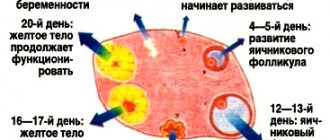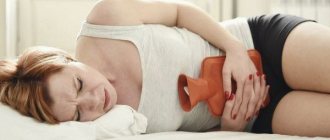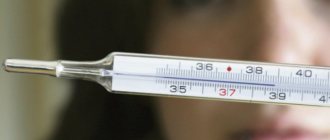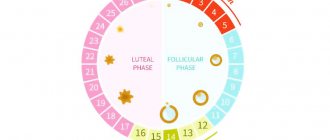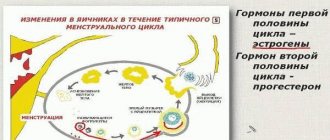Hormonal melancholy, or female depression. PMS: causes, symptoms, help.
Why is it worth talking separately about “female depression”?
Indeed, mood disorders have no gender, and the mental structure of men and women is the same in structure. However, the statistical prevalence of depression is higher among women, with one in eight women experiencing at least one depressive episode during their lifetime. The series of articles “Hormonal Melancholy” is devoted to depressive states caused by hormonal fluctuations, which any woman regularly experiences. Premenstrual syndrome (PMS) .
Fluctuations in hormonal levels are most often associated with reproductive cycles in the female body. The menstrual cycle, pregnancy, the postpartum period, menopause, infertility or a conscious decision not to have children - all of these events have a specific effect on changes in a woman's mood, and for some, such a change signifies the onset of a depressive episode. Research confirms that hormones have a powerful effect on the chemistry of brain processes, including those areas that regulate the general emotional background and methods of emotional response, and the perception of reality. The very mechanics of the hormonal “invasion” still have no explanation, and so far we have to deal with the visible consequences.
It should be said that hormonal changes themselves do not cause depression. Hormones provoke a depressed state if a woman previously had a predisposition to this. However, there is a situation that is universally reflected in the mental state of every woman - premenstrual syndrome, or PMS.
A syndrome is a combination of symptoms or manifestations. Physical discomfort manifestations (swelling, pain in the abdomen and lower back, drowsiness, pressure fluctuations, drowsiness or insomnia, increased appetite and craving for “junk” food or specific products, etc.) are combined with psychological ones - the picture of perception of oneself and the world changes. According to one theory, PMS is like a “rehearsal” for pregnancy, during which a woman experiences a change in her concept of “I”. This change causes great internal tension due to inevitable conflict. From the outside, a woman may look aggressive and at the same time lethargic, capricious, unbalanced and disinhibited, or, on the contrary, inhibited.
Subjectively experienced by a woman as unpleasant or even painful, the psychological symptoms of PMS begin to appear 7-10 days before the first day of the cycle and disappear in the first days of menstruation. The symptoms are similar to those of classic depression, although in fact they are not.
PMS SYMPTOMS
- decrease in energy level . There is no strength for open and active interaction with the world. Locking yourself in and concentrating on yourself (as a way to save energy); - tearfulness , sentimentality; - irritability (there is no energy, but there are environmental stimuli that require a response. For example, the need to perform routine household chores, be effective in the workplace, behave in a familiar way with loved ones); — increased demands on physical comfort . Strong stress can be caused by sharp odors, sounds, unpleasant tactile sensations, uncomfortable environmental temperature, lack of cleanliness, the need for active physical activity, etc.; - a feeling of loneliness, melancholy , decadent moods (“nothing good awaits me in life”, “no one loves or appreciates me”, “no one needs me”, etc.); - a tendency towards self-accusation and generally searching for those to blame for all troubles. Having started a quarrel, a woman can immediately plunge into the experience of her own guilt; - manifestation of sudden irrational fears (getting into a car accident, suffocating in a crowded subway car...). Fears are combined with a distorted vision of situations; - decreased concentration, attention, memory impairment. Absent-mindedness, decreased ability to set a goal and achieve it (weakness of the volitional sphere as a whole); - generalized thinking - a decrease in the ability to be specific, while it is possible to cling to little things (making a mouse out of a mouse into an elephant as a reason for conflict).
Since this whole “parade” is commanded by hormones, over which we have no control, we can alleviate the condition in accessible ways. (Hormonal therapy, due to the poor predictability of the result, is currently not a clear indication for PMS).
HELP FOR PMS
An unstable psychological state in itself makes a woman dependent on the environment - both physical and social. Particularly important figures are close people and those with whom a woman has constant emotional contact. In this regard, it makes sense to warn such people in advance about possible outbursts of anger, instability, expression of unfounded claims, tearfulness, etc. (“I may be a little different, seem unfair or dissatisfied, but this has nothing to do with my attitude towards you.”) It is enough to say about this a little in advance and ask for a little leniency and understanding, because such behavior does not bring much joy to the woman herself, not to mention the painfulness of individual manifestations of PMS.
How to deal with severe PMS
- fatigue
- poor coordination
- feeling of losing control of oneself
- feelings of worthlessness and guilt
- headache
- anxiety
- voltage
- pain
- irritability
- mood swings
- weight gain
- food cravings
- lack of interest in normal activities
- convulsions
- feeling sad or depressed
- breast tenderness
- sleep problems
- difficulty concentrating.
Premenstrual syndrome is different from premenstrual dysphoric disorder (PMDD), which is less common (3-5% of women of reproductive age experience it).
Women experiencing premenstrual dysphoric disorder experience severe depression before their period, with possible suicidal ideation. There is no single clear theory that can accurately explain why only some women experience PMDD or PMS. But some women are known to experience mood changes before their period due to even slight fluctuations in reproductive hormones. In these vulnerable women, small changes in estrogen and progesterone levels lead to changes in central brain chemicals (GABA, serotonin and dopamine), which then affect mood and behavior before the menstrual cycle.
However, many of the physical symptoms of PMS, such as breast tenderness, bloating, headaches and constipation, are a direct effect of reproductive hormones. Thus, with PMS, both the mind and body suffer.
Estrogen appears to be a “protective” hormone, that is, it protects the psyche from depression. Estrogen directly influences serotonin and dopamine levels to achieve this beneficial effect. Thus, depression and other adverse mental symptoms may appear or worsen during the phase when estrogen levels are low. This occurs in girls and women four to seven days before menstruation and during the transition to menopause.
Progesterones may have the opposite effect. Many women taking progesterone-only birth control pills experience depression.
The reasons for the appearance of more severe mood swings before menstruation are not yet clear, but it is believed that the breakdown product of progesterone, allopregnanolone (ALLO), is involved. The latest theory is that these women's brains don't respond normally to ALLO, so they become anxious. This is important for further study, and new drugs that affect ALLO are already being developed and tested.
The reasons for mood changes before your period are complex, but there is an association between psychological and social issues, as well as hormonal and neurochemical factors. Higher education, supportive relationships, fewer socioeconomic problems, and good physical health appear to be beneficial but do not completely alleviate PMDD symptoms. Overall, premenstrual dysphoric disorder appears to be biologically based.
Understanding the mind-body connections in both PMS and PMDD is critical to developing effective management strategies for the many women who suffer from significant depression and other problems on a monthly basis. Treatment options must consider all aspects of a woman's life, including her job, relationships, past traumas, current physical health, and daily needs.
Many women with PMDD need hormonal treatment and other strategies, such as antidepressants, to help them improve their quality of life. It's a good idea for women suffering from PMDD or PMS to keep a diary of their cycles and moods. Women can be confident that their observations linking hormones and moods are valid.
First of all, it is important to recognize the connection between hormones and mental health.
Physiology
Depending on what phase the menstrual cycle is in, a woman’s condition, both psychologically and physically, is different.
As a rule, you feel better in the first half of the cycle. Before menstruation, which is from 2 to 14 days, PMS (premenstrual syndrome) occurs and the woman feels unwell.
A number of disorders are observed in the body: vegetative-vascular, endocrine, and mental disorders.
Women with mental health problems are most susceptible to the negative consequences of PMS. When diagnosed with manic-depressive psychosis, 86% of women experience PMS symptoms.
The manifestation of PMS is characterized by the following signs:
Other painful sensations are also observed. Immediately before menstruation, women may experience changes in behavior and mood: unreasonable aggression, increased sensitivity, irritability and malice.
These are signs of so-called dysphoric disorders. Along with this, sleep disturbances occur, appetite becomes sluggish, and sexual activity is impaired.
A state of fear and anxiety may also be present.
Depressive and anxiety states may increase against the background of PMS. During this period, there is an increased risk of suicide.
During PMS, women with mental disorders of an endogenous nature experience an exacerbation of their mental state. Manifestations of the disease can be detected at a young age in teenage girls. This makes it possible to take preventive measures and diagnose depression at an early stage. Menstruation is a kind of indicator for identifying abnormalities in mental health.
During menstruation, the body weakens its ability to resist stress, and the nervous system is vulnerable. Variability in mood clearly increases in the initial and final stages of depression with cyclothymia.
Women usually do not resort to the help of doctors with PMS, but use folk remedies. In the presence of pronounced mental disorders, one cannot do without qualified medical assistance and a course of treatment with psychotropic drugs.
Psychotherapeutic correction is also carried out. Depression before menstruation requires treatment. Even if the patient has recovered from the state of depression, but negative conditions are observed before menstruation, then taking antidepressants should be continued until the symptoms are eliminated and the disease relapses. Antidepressants should have minimal side effects and be easy to tolerate.
How is tearfulness expressed?
Many people know firsthand how difficult it can be to restrain yourself: not to scream, not to cry, not to get angry. And if we analyze, for most women such changes occur precisely in the second phase of the cycle, sometimes closer to or during menstruation. Tearfulness is one of the common manifestations of premenstrual syndrome, and it can manifest itself in different ways.
Some women feel oppressed and abandoned. Approaching the mirror, their appearance only causes bewilderment. You feel sorry for yourself, your mood drops, and tears begin to fall in hail. Attempts to console the girl may result in even greater intensification of crying, which makes both the “comforter” and herself feel uncomfortable.
There is also another option. Some girls become aggressive on the eve of their period, react sharply to any criticism, and are ready to fight at any moment and defend their opinion. But as soon as events begin to unfold, such an “offensive” mood is replaced by a sharp transition to loud, sometimes even demonstrative crying. All these aspects of behavior are also largely related to changing hormonal levels.
Causes
Scientists give this explanation for the state of depression in women - hormonal changes in the body. 21-28 days before the onset of menstruation, the amount of estrogen produced drops sharply. Taking hormones does not give the desired effect. According to some experts, the following factors provoke depression:
- seasonal exacerbations;
- past stressful situations;
- emotional overload;
- disorders of the thyroid gland.
Women with an unstable psyche, prone to hysterics and neuropathy, are susceptible to depression. Weakened, insufficient nutrition can also trigger depression. The transition to a nutritious diet allows you to get rid of unpleasant symptoms, although not completely.
Symptoms
We list the most characteristic symptoms:
- sudden mood swings;
- increased absent-mindedness and weakness;
- feeling of constant causeless anxiety;
- mild emotional vulnerability, tearfulness;
- causeless aggressiveness and outbursts of anger;
- headache;
- sleep disturbance, insomnia;
- sudden transition to salty or sweet foods.
For a woman, such symptoms may go unnoticed, but for the people around her, no. People notice changes and disturbances, primarily with normal sleep. During the day, women feel overwhelmed, feel lethargic, and lose their appetite. The whole body hurts, the joints are twisted, the state is completely broken. What is the way out of this situation? If you do not seek qualified help in time, then in the most severe cases a woman may commit suicide. Psychotherapeutic correction is extremely necessary.
Treatment
The severity of the depressive state is determined by doctors. The course of prescribed treatment depends on this.
To overcome depression, specialists can prescribe the following medications:
- sedatives and antidepressants;
- contraceptive hormonal drugs (allow you to relieve the most unpleasant symptoms);
- drugs to stimulate blood circulation in the brain;
- taking vitamin-mineral complexes (minerals - calcium, zinc, iron, magnesium B6; vitamins - A, B, C).
General therapy
The course of treatment includes the following methods:
- therapeutic;
- physiotherapy;
- massage, both classic and acupressure;
- reflexology;
- acupuncture sessions;
Phytotherapy
To prevent depression, experts recommend taking phytohormones with estrogens. This course will bring the level of hormones in the blood to an optimal state. The following plants are recommended as herbal medicine:
- common wormwood (relieves muscle and vascular spasms);
- black cohosh (cohosh rhizomes);
- bearberry (antiseptic, relieves swelling).
Tea mixtures made from oregano, motherwort, hop cones, lemon balm, peony roots and mint will help relieve increased excitability, normalize sleep, and reduce nervous stress.
Soothing baths
Taking relaxing baths with the addition of various components of natural origin, according to experts, will help reduce the likelihood of depression. Essential oils of lavender and lemon wormwood are used as additives. Foot baths with lemon balm, cucumber, and rose petals are also effective. After the bath, massage your feet using fir oil. To normalize sleep, use pillows with various fillings:
- lavender color;
- currant leaf;
- mint leaves;
- oregano herb.
Fighting depression
A severe emotional state on the eve of critical days poses a threat to the woman herself and poisons the lives of those around her. Therefore, to combat premenstrual syndrome, you need to consult a specialist.
Hormone therapy is not always effective for such abnormalities; moreover, it is considered a gross interference in natural processes. To get rid of depression before menstruation, gentler, safer methods are recommended.
Vitamin therapy
To get rid of depression and despondency during menstruation, it is often enough to change the principles of nutrition:
- Avoid unhealthy and heavy foods (fatty, fried, smoked and pickled).
- Take complexes of minerals and vitamins: A, B6, E, calcium and magnesium. B vitamins are very important for the normal functioning of the nervous system; nutrition must satisfy the need for them.
- Be sure to include fresh vegetables, fruits, fish and eggs, and dairy products in your diet.
- Reduce the amount of salt you consume.
Replenishing the level of necessary substances in the body helps to improve the functioning of organs and systems , improve well-being and appearance, and even out the emotional background.
Folk remedies
You can relieve the symptoms of depression during PMS using traditional medicine methods:
- Drink soothing teas based on motherwort, chamomile, mint and other herbs with a sedative effect.
- Take relaxing baths with essential oils. Conifers, lavender and mint are suitable for these purposes. Citrus fruit esters - orange, grapefruit, tangerine - can improve your mood and give you strength. Baths with sea salt have a good effect.
- Massage. With its help, you can get rid of mental stress and improve the general condition of the body.
Allergies may be a contraindication to the use of folk remedies for depression. If you are hypersensitive to any herbs or essential oils, you should avoid using them.
Sleep and rest mode
Establishing the right routine will help you cope with depression during your period. It is necessary to rest more during the day, get enough sleep at night, and avoid overwork.
Sports and hobbies
Physical activity will help you avoid crying before your period. Walking and playing sports will help relieve stress and give you an outlet for energy.
Doing what you love is a great alternative to crying. Spend time on your hobbies - dancing, drawing, cross-stitching. Such pastime brings emotional satisfaction and helps relieve stress.
Prevention
For preventive purposes, according to the recommendations of specialists, the diet should be adjusted. Food is consumed without salt in large quantities. The use of infusions with a diuretic effect should be increased. Nutrition should be healthy and balanced. Particular attention should be paid to the presence of vitamin B6 and potassium in food products.
To do this, you should include the following products in your diet:
chocolate, grapes, raisins, cocoa, fish, bananas, eggs, apples, broccoli.
In cases of depressive exacerbations, a course of medication is taken. Injections of solutions with vitamins A, B6, E, magnesium and calcium. This will bring metabolic processes in the body and hormonal levels back to normal. Sports, physical education, and fitness can relieve unpleasant symptoms.
Causes
Possible causes of depression before menstruation:
- The amount of estrogen hormones decreases. Because of this, mental destabilization occurs.
- Serotonin levels decrease. As a result, a woman stops enjoying her favorite hobbies, she becomes whiny and gets tired faster. This hormone is responsible for positive emotions.
- Lack of vitamins. This often occurs in autumn and spring, as well as after prolonged illness.
- Stressful situations. Before menstruation, a woman becomes more sensitive to stress, so heavy work loads or family problems cause depression.
- Health problems. For example, thyroid diseases. They affect the endocrine system.
- Bad feeling. Before menstruation, a woman may experience severe pain in the lower back, lower abdomen and mammary glands. They negatively affect the quality of life and cause irritation.
In addition, changes in climate can have an effect, for example, in winter, depression occurs due to lack of sunlight.
Causes of PMS
Modern medicine has accurate information about why mood changes before menstruation. Deviations in well-being and behavior during this period are due to the complex influence of several factors of varying degrees of significance:
- Hormonal changes. They play a leading role in the deterioration of physical and mental condition shortly before menstruation. In the second half of the cycle, the amount of estrogen in the blood decreases - this destabilizes the psyche and emotional reactions, irritability, aggression, and unmotivated tearfulness are manifested in behavior. At the same time, the level of the hormone serotonin, which is responsible for positive emotions, drops to a minimum in the female body. The feeling of weakness, fatigue and weakness these days is due to the high level of progesterone in the blood.
- Avitaminosis. A lack of important microelements in the diet can confidently be attributed to the causes of emotional instability and depressive moods. A lack of magnesium and B vitamins has a particularly noticeable effect on the psyche. They play an important role in the functioning of the nervous system, and also indirectly affect hormonal balance.
- Stress. High stress at work, responsibility for the family, and worries are a woman’s daily companions. But if on ordinary days you manage to keep your behavior under control, then before PMS depression comes close. Changed hormonal levels and a lack of important substances reduce resistance to stress and emotional overload.
- Unstable psyche, prone to neuroses and hysteria. All this indicates a predisposition to depression in the second half of the cycle.
- Problems with the thyroid gland. They negatively affect the functioning of the entire endocrine system and affect the state of the psyche.
Changes in a woman’s behavior and emotional reactions are partly facilitated by seasonal factors - lack of sunlight (autumn and winter), unfavorable weather conditions. They are not a direct cause of depression, but they contribute to the loss of strength and mood.
Symptoms
To recognize depression, you should pay attention to changes in the patient’s character and behavior. She may become apathetic and distracted. The woman will perform all usual actions slowly and reluctantly. Interest in your sexual partner will also disappear.
Patients suffering from this mental disorder are characterized by tearfulness and irritability. Outbursts of aggression may occur. Even with depression, self-doubt appears. A woman begins to doubt the correctness of her choice of profession or life partner. Eating disorders, insomnia, and headaches are also common.
If measures are not taken in time and the disease progresses, thoughts of suicide will appear. In this case, treatment in a psychoneurological center will be required.
PMS symptoms
All of the above factors together have a negative impact on a woman’s physical well-being and psyche. They provoke increased tearfulness before menstruation and other behavioral disorders. Symptoms of PMS include:
- frequent migraines;
- tendency to become tearful for any reason;
- irritability, nervousness;
- uncontrolled aggression;
- sleep disorders;
- inattention, absent-mindedness (often the cause of injury);
- eating behavior disorders;
- weakness, increased fatigue.
The condition is aggravated by pain in the chest before menstruation and in the lower abdomen. Due to hormonal changes and related factors, a woman during this period is prone to tears, irritable, her mood is almost constantly bad, the world seems gloomy and hostile to her.
The tendency to cry before the upcoming period is a common complaint, but this condition is not always directly related to the cycle. To understand whether there is a connection between these phenomena, it is recommended to observe your reactions for some time.
If all symptoms disappear without a trace after menstruation, we can assume that depression is directly related to the phase of the cycle. This must be taken into account when choosing corrective measures.
